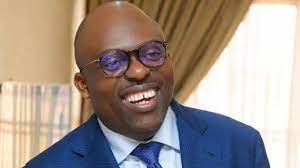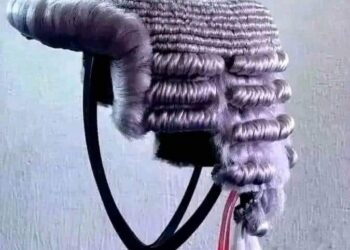The Federal High Court sitting in Abuja refused the application filed by Department of State Security (DSS) to mask its witnesses in the trial of the Director of Radio Biafra, Nnamdi Kanu.
The DSS had sought the court’s permission to mask its witnesses that will testify against Kanu.
In his ruling, the trial judge, Justice James Tsoho held that while the applicants prayer sought that accredited journalists be allowed to cover the trial, Section 232 subsection (4) of the Administration of Criminal Justice Act (ACJA) specifies offences for which criminal acts should be secluded.
He further held that the court is swayed to the submission of the respondent that section 232 (4) of the ACJA does not support the applications of the applicant (DSS).
“There is no gain saying that demeanor of witnesses is very crucial in a trial,”
Giving the dictionary meaning, the court held that demeanor most times helps the court in its decision, adding that he agrees with the defense counsel, Chuks Muoma that the demeanor of a witness is better observed from their faces rather than behind masks.
Prosecuting counsel, David Kaswe had applied to the court to allow its witness protection, arguing that he is not calling for secret trial but that the witnesses who feared for their safety wear masks while testifying during trial.
Justice Tsoho held, “The prosecution (DSS) has all the means to protect the witnesses.”
In addition, the judge noted that the DSS has already given names of its witnesses – eight of them.
He said that court records show that except for witness number five whose name is not given, other witnesses live in Lagos, Port Harcourt and Enugu.
“It is not correct therefore to assert that many of the witnesses come from the accused persons location,” he said.
The court however refused prayer five that witnesses wear facial masks, granting prayers one, two and three of the application.
The judge added that names and addresses of the witnesses shall not be made public in any of the recordings of the trial process, declaring , “l, Justice Tsoho consequently adjourned the matter till 7,8,9,10 and 11 of March for trials.”
Kanu and his two co-accused, – David Nwawusi and Benjamin Madubugwu – are being prosecuted on six-count of treasonable felony, unlawful possession of firearms and other offences bordering on their agitation for secession of the Republic of Biafra from Nigeria.
The prosecution, by its application, seeks an approval of the court for its witnesses to wear mask while testifying and an order barring members of the public apart from parties, lawyers and accredited journalists from attending the trial.
Justice Tsoho entertained arguments for and against the application on Friday and indicated to return to deliver his ruling by 2pm.
At the hearing of the application, prosecuting counsel, Mr. David Kaswe, told the court that government’s witness had expressed fear about their security and that they were unwilling to testify if they were not guaranteed any form of protection.
Kaswe said, “Our application before this honourable court is to allow our witnesses most of whom are civilians residing in the geographical entity of the defendants.
“Our submission is that our witnesses that we intend to call have already expressed fear of insecurity.
“They categorically informed us that unless, they can be guaranteed some form of protection by this honourable court they are unwilling to come and testify.
“We submit with greatest respect that the case of the prosecution will be greatly frustrated in the event that the witnesses are not protected and they cannot come to court.
“The court is to do justice and there will be no justice of prosecution witnesses cannot come to court.
“We are very unambiguous in our application that accredited members of the press should be allowed to come in. They can be allowed to cover the proceedings. That simple application before the honourable court.”
While acknowledging that the there was the need for the judge to watch the demeanour of the witnesses while testifying, Kaswe said that could still be achieved without the judge seeing the face of the witnesses.
But in opposing the application, defence counsel, Mr. Chuks Muoma (SAN), said that granting the application was tantamount to allowing “masquerades” to testify in court.
He said, “But Section 36(4) of the Constitution referred to in paragraph 2.07 of our written makes no provision for masquerades to testify as witnesses in a trial.
“An accused person under our jurisprudence and justice administration must be confronted with his accusers’ eyeballs to eyeballs.
“It is consistent with common sense and jurisprudence that you cannot to accuse someone in the street and try him in the bedroom.
“I must confess that in my 45 years of legal practice, I have not witnessed this.
“You malign a man in the public and you seek to try him in the bedroom and have masquerades to testify against him.”
Muoma also argued the prosecution could only have brought such application if the accused persons were charged with terrorism offences.
But the Federal Government’s counsel in his response on points of law, said the submission by the defence was erroneous, arguing that section 232(4) paragraph (e) of the ACJ Act gave the court the discretion to grant protection to prosecution witnesses.



